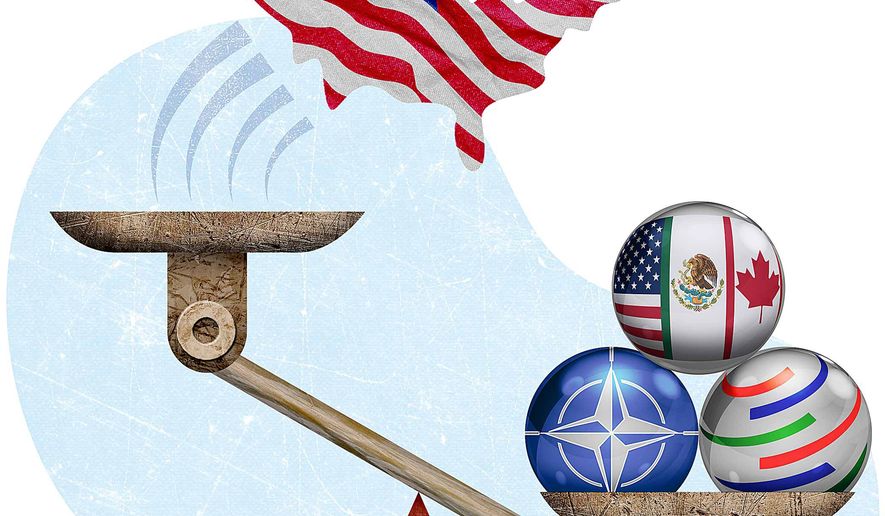OPINION:
President Trump recognizes U.S. foreign policy has for too long sacrificed economic interests and the livelihoods of ordinary working Americans for other important goals — spreading democracy, human rights and alliance building. And we are not getting our money’s worth — our allies expect Americans to bear disproportionate shares of the costs and risks to military personnel of dealing with maelstroms created by Russia, terrorists in the Middle East, China in the Pacific and the like.
America is simply not wealthy enough to bear all those burdens. Along with the harm from one-sided globalization, President Obama and Secretary Hillary Clinton acknowledged this reality but ultimately accommodated those by joining hands with our allies to appease Russian aggression in Ukraine and elsewhere with half-hearted sanctions, enabling the ascent of China through the inadequate rules and false justice of the World Trade Organization (WTO), caving in to Iran with a lousy Joint Comprehensive Plan of Action (JCPOA) and procrastinating on North Korea.
The malignant dysfunction China creates in the WTO is duplicated on a smaller scale by trade deficits through bad deals with Germany, Japan, Mexico, South Korea and others.
NATO, WTO, NAFTA and other regional economic agreements were lopsided from the start and in varying measure are now outdated. TPP would have been unfair and an anachronism before the ink dried, because Mr. Obama on key issues like currency and pharmaceutical patents did a better job of negotiating for our prosperous trading partners and the NGO poverty industry than for American national interests.
America can’t retreat into the normalcy of Warren G. Harding or the protectionism of Herbert Hoover. Nuclear missiles and Internet-enabled terrorists reach too far, and America’s big economic drivers — high tech, health care, agriculture and energy — need global markets to sell the fruits of American R&D and create broader economic growth.
The Axis of Mediocrity — the Bush-Clinton-Bush-Obama alternating dynasties — were too heavily invested in global governance. With the exception of the Iraq War, they bent to our allies’ love of international institution and most basic manifestation of the multilateral insanity — when diplomacy and half-hearted sanctions fail and then fail absolutely, do yet more diplomacy and half-hearted sanctions.
That’s how we got Russia in the Crimea, the Iran deal, endless terrorism in the Middle East and North Korea with missiles aimed at Seattle.
Leon Panetta says Mr. Trump is intent on dismantling his predecessor’s achievements without a strategy to replace them. While his tactics — manufacturing crises by withdrawing from the Iran deal, threats and bluster for Kim Jong-un and refusing to cooperate with Europe in the flawed WTO — are unorthodox, his vision is crystal clear.
Mr. Trump wants a fair share for all Americans from the opportunities globalization offers. On security issues, he wants our allies in NATO, the Pacific and the Middle East — Saudi Arabia — to stop being clients and better defend their own sovereign interests — and to behave like allies, not adversaries, on economic issues too. And a deal with Iran that permanently ends its nuclear ambitions, ballistic missile program and terrorist activities, and an equivalent arrangement with North Korea.
The president has a strong unified team on security issues with John Bolton, Mike Pompeo and Jim Mattis all singing from the same score — but not so economic issues.
He sent to China Peter Navarro, wilbur Ross, Lawrence Kudlow and Steve Mnuchin to persuade China to reform its economy in ways that make it broadly consistent with Western free market capitalism and WTO rules. That’s an impossible task, because President Xi Jinping and the Chinese Communist Party believe in neither freedom nor markets. In the offing appear limited agreements with few positive consequences for the trade deficit.
The American trade quartet can’t even agree about the details of an acceptable deal. The Chinese exploiting these divisions peeled off Treasury Secretary Steve Mnuchin for private talks without the others. He represents Wall Street, which does not see a problem with the mega trade deficits it facilitates with neat financial engineering. He protected Wall Street’s interest in the recent tax reform — he safe harbored the much reviled carried interest, which lets financiers earning millions pay lower tax rates than your family doctor.
The de facto goal — harmonization of China with the West — and team’s divisions are laughable and of the sort once thought more likely in a third Bush administration. Thankfully, Mr. Obama’s offspring have yet to sprout presidential ambitions.
• Peter Morici is an economist and business professor at the University of Maryland, and a national columnist.




Please read our comment policy before commenting.